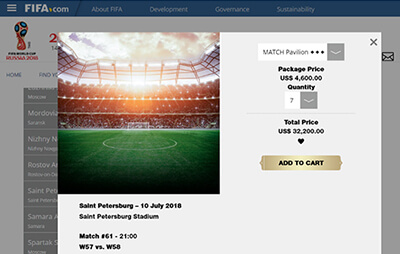This Just In
Amid World Cup mania, here’s a look at how to kick up returns from corporate events.
The 2018 FIFA World Cup is in full swing in Russia, and while each match adds more goals to the memory of every football fan, what sort of returns can be expected from the money spent on hospitality events at the stadiums?
At the time of writing, hospitality packages for the World Cup semifinals were available at $4,600 per person — could you make a return on that spend?
 Clearly, corporate hospitality at sporting events and venues is big business. After a slump during the recession, a rise in demand for sports tourism is being seen throughout the world. Such tourism is benefiting from an increased emphasis on health and fitness, and the use of sporting events by destinations as a pull-factor to attract tourists. Hosting major sport events such as the FIFA World Cup or the Olympic Games has caused positive shifts in tourism demand, and the target by destinations is always to make this a long-term legacy of the event. Additionally, sports clubs and event management companies have joined to offer exclusive and premium corporate experiences.
Clearly, corporate hospitality at sporting events and venues is big business. After a slump during the recession, a rise in demand for sports tourism is being seen throughout the world. Such tourism is benefiting from an increased emphasis on health and fitness, and the use of sporting events by destinations as a pull-factor to attract tourists. Hosting major sport events such as the FIFA World Cup or the Olympic Games has caused positive shifts in tourism demand, and the target by destinations is always to make this a long-term legacy of the event. Additionally, sports clubs and event management companies have joined to offer exclusive and premium corporate experiences.
Hospitality is, of course, not all that is available. Today, stadiums and arenas regularly attract conventions, trade shows, and conferences, by offering all amenities and facilities needed for a successful meeting. Many even include conference rooms with views of the playing area — hallowed turf that can be experienced first-hand after the meeting. However, no matter how enticing, to be truly valuable corporate hospitality has got to pay. Organisations host events because they want to see a financial return and corporate hospitality is no exception.
Yvonne Goodright, regional conference and events marketing manager for Jockey Club Venues London, says: “It makes sense to bring existing and prospective clients together, as the type of top clients you will invite are likely to say great things about your business that impress your hot prospects — and without any coercion.”
Sharing high-quality, memorable experiences is an effective means of establishing a more personal rapport with clients, potential clients, and other people important to your business’ success, but how do you quantify it?
This will always depend on the objectives and corporate hospitality should always have objectives.
Angela Colley, Head of MICE Sales, Silverstone Circuits Ltd., the U.K.’s only Formula One track, says, “We take a view that corporate hospitality is about quality over quantity. Invite guests that have the potential to have the greatest effect on your business, so that’s your most valuable clients, your hottest prospects, and also smaller clients that have the potential to spend much more. There’s no point in inviting clients whose capability to scale up their spend with you doesn’t exceed the amount spent on their experience by a significant margin.”
Applying a formula can help: Say that for every euro spent on hospitality, the goal is earning five back. To see a return, create the most impressive and enjoyable experience.
Aim for the best possible price but remember this a golden opportunity to build stronger relations with a client — there is no point in doing it cheaply. This is an important point, because in this internet age where competitors’ information and pricing are instantly available, customer loyalty is rare. Hospitality can deliver a return on investment simply by helping retain clients, rather than having to spend a huge proportion of a budget on recruiting new ones.
To set a budget, consider the potential value of the guests to be invited — in terms of net profit — as customers of your business. Then set a figure that represents a workable percentage of this as your annual hospitality budget. No more than 10 percent is probably about right.
Support the budgetary process with an analysis of the success of the hospitality event. Carry out surveys seasonally and annually to track predicted gains from a corporate hospitality event against actual performance and amend your strategy according to your results.
It’s not considered effective to hard sell to guests on that day. But there are ways to prepare because some guests may want to talk business and at the very least, it’s perfectly acceptable to request follow-up activity to build on the relationship. Allocating well-briefed staff to certain clients is usually a good strategy for achieving this.
After the hospitality event, it pays to have an expectation as to when you will see a response, or reap your return. Be realistic. Hospitality can be a long-term game. Returns on investment are usually seen within three months of the event, but it can be longer.
Now, anyone interested in that World Cup semifinal package?

